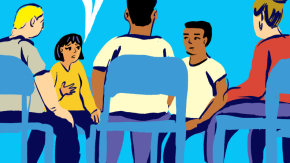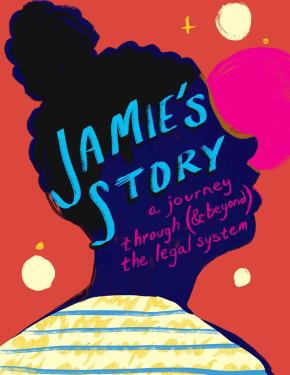
This Human Trafficking Prevention Month, learn how we’re supporting survivors of human trafficking in healing from traumatic experiences and becoming leaders and advocates in their own communities.
People who are most impacted by an issue know best how to find lasting solutions. That’s especially true of human trafficking, where far too often, survivors have been criminalized and further harmed by our systems instead of receiving the support and protection they need.
The Center works with survivors of human trafficking to offer paths out of the criminal legal system and foster healing from the extensive trauma many survivors face. We also help courts and communities around the country embrace restorative, non-harmful ways of addressing trafficking and supporting survivors as they navigate the legal system.
One of our recent initiatives, Project HEAL—which we launched in collaboration with Courtney’s House, CATCH Court, and rights4girls—helps empower survivors of human trafficking to become leaders and changemakers in their communities. Working closely with survivors and advocates, our team created a framework for engaging with survivors in ways that are collaborative, supportive, and sensitive to traumatic experiences.
The materials include two curricula, one for youth survivors and one for adults. Each guide walks practitioners and survivors through self-care strategies to manage trauma, leadership and advocacy skills, networking and community building strategies, and more—all in a supportive and age-appropriate way. The materials also include tips for ensuring that survivors have a real say in shaping the programs meant to serve their needs. The goal is to help build programs for survivors that support them in advocating for systemic change while respecting their agency and comfort.

"Jamie's Story," one graphic novel in our Child Witness Materials series for young survivors of human trafficking.
Some of those same aims were behind our Child Witness Materials project, where we helped design graphic novels for young survivors of human trafficking who are navigating the criminal legal system. The booklets teach young people about their rights, the roles of different people in the system, and how the legal process works. But just as importantly, they bring comfort and strength to young survivors with coping exercises, illustrations, and stories from people who have lived through similar experiences. Recently released audiobook versions of the novels are voiced by young people who are survivors of trafficking themselves.
We also uplift and support survivors of trafficking through community advocacy work. With our Queens HOPE program in Far Rockaway, we host workshops and raise awareness about sex and labor trafficking in schools and throughout the larger Rockaways community. The program also aims to build education around wider issues of gender-based violence and intimate relationships. Moving forward, our goal is to help young survivors of trafficking in Far Rockaway get access to resources for needs like housing, mental health treatment, education, and more.
Building real safety for survivors of trafficking means putting survivors’ diverse needs and experiences at the forefront of our policies and practices. Only when our systems are really responsive to those needs and experiences—first and foremost, through the leadership and advocacy of survivors themselves—can they truly help instead of harm.

